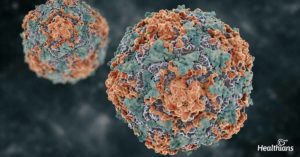Contributed by – Healthians Team
As per WHO, 52 million people in India are affected by hepatitis. The numbers are indeed scary. Hepatitis is a major chronic disease for us. If not treated on time, it can be fatal. Therefore, it is important for you to know about this disease to be able to prevent it. In this article, we will discuss everything about hepatitis – it’s types and complications.
What is Hepatitis?
The word “hepatitis’ means an inflammation of the liver. It is derived from the Greek word hepar which means “liver” and itis means “inflammation“. Several different agents such as bacteria, viruses, excessive alcohol intake, drugs, and autoimmune diseases can become the cause of hepatitis. Among these, the hepatitis family of viruses is particularly dangerous because these viruses can cause large scale outbreaks and even epidemics that may put whole communities at risk.
Hepatitis in infants and children:
- 80–90% of babies infected during the first 5 years of life develop chronic infections.
- 30–50% of children infected before the age of 6 years develop chronic infections.
Hepatitis in adults:
- Less than 5% of otherwise healthy persons who are infected as adults will develop chronic infections.
- 20–30% of adults who are chronically infected will develop cirrhosis and/or liver cancer.
Although all the hepatitis viruses (A, B, C, D & E) can cause inflammation of the liver, they differ in individual characteristics.
They sound similar but they aren’t: Know the differences between Hepatitis A, B, C, D, and E

Hepatitis A & E: The food and water-borne viruses
Food or drinking water contaminated by even a small about of fecal matter containing the virus can become the cause of the spread of both these viruses. Symptoms of hepatitis A and E include jaundice (yellowing of the skin and eyes), fever, loss of appetite, and vomiting. The viral infection can be either mild or severe and most of the people make full recovery when treated properly. However, hepatitis E can be particularly dangerous for pregnant women.
Prevention measures include vaccination against hepatitis A, as well as being careful about sanitation and food preparation. This is even more necessary for hepatitis E since there is no vaccine to guard against this virus in India.
Hepatitis D: The Delta virus
People suffering from hepatitis B are prone to hepatitis D. The infection caused by the virus leads to inflammation of the liver which can further cause liver damage and several long term liver problems. Hepatitis D can be both acute and chronic in nature. Currently, there is no proper treatment available for hepatitis D. One can only stay cautious to prevent it.
Hepatitis B & C: The blood-borne viruses
Hepatitis B and C are more dangerous and spread through contact with the blood or body fluids of an infected person. This can happen through the sharing of contaminated needles, syringes, drug injection equipment, and unsterilized dental tools and barber instruments. Hepatitis B can be transferred through unprotected sex and by an infected mother to her child at birth.
Both viruses can cause a short term (acute) infection in which most people clear the virus from the body within 6 months and there is no long term liver damage. The body can develop a chronic infection in case the virus persists in the liver for a long time, potentially leading to serious complications such as liver cirrhosis, liver failure, and even cancer.
A vaccine can help prevent hepatitis B. For chronic hepatitis B, there are medicines and oral antivirals that help suppress the multiplication of the virus and most people must continue with the treatment for the lifetime.
For hepatitis C, there is no vaccine yet, but there are specific medicines and direct-acting antivirals to effectively cure over 95% of patients with just a short course of treatment.

Symptoms of Hepatitis
During an acute infection, many people may not develop symptoms but those who do, report some of the following:
- Jaundice
- Dark yellow urine
- Fatigue
- Fever
- Nausea
- Vomiting
- Grey/clay-colored stools
- Abdominal pain
- Joint pain
- Loss of appetite
There are a very small number of people who progress very quickly to a highly virulent form which can lead to acute liver failure and deaths. This makes it important for patients who observe these symptoms to talk to their doctor. To detect the presence of the virus and to prescribe appropriate treatment, the doctor may recommend a series of tests.
People at risk of these infections include those who have received blood transfusions many years ago or were exposed to any of the mentioned sources.
Several complications caused due to Hepatitis
Not all patients who have symptoms during the acute phase develop chronic infections and many patients who have a chronic infection may not have experienced any symptoms earlier. For these reasons, the infections are important to identify and treat as they may silently lead to serious complications such as:
- Liver Cirrhosis: The liver has the amazing ability to regenerate itself. But when the damage is too much, as can happen in chronic hepatitis, healthy liver tissues are gradually replaced with scars that affect the functioning of the liver. This is called cirrhosis.
- Liver Failure: Here, the liver is no longer able to perform its normal functions. Many complications occur. There is a threat to the patient’s life and they need a liver transplant to survive and get better.
- Liver Cancer: Patients with chronic hepatitis B & C are more likely to develop liver cancer, especially if they have already developed cirrhosis.
The severity of Hepatitis B
Chronic hepatitis B cannot be totally eradicated but the virus can be suppressed by medications. This will prevent many of the complications mentioned. There is also a vaccine to prevent and protect from the virus contamination.
This year, the WHO (World Health Organization) strongly focuses on preventing hepatitis B among mothers and newborns.
Most of the people only visit the doctor when some symptoms appear but this could be a stage when liver health has already started to deteriorate and the liver is in a critical condition. The wise thing to do is to talk to your doctor and get tested if you been exposed to the risks identified above.
Diagnosis of hepatitis
- Liver function test: Liver function tests use blood samples to determine how efficiently your liver is working.
- Ultrasound: An abdominal ultrasound uses ultrasound waves to create an image of the organs within your abdomen. This test allows your doctor to take a close look at your liver and nearby organs. It can reveal the fluid in your abdomen, liver damage or enlargement, liver tumors, and abnormalities of your gallbladder.
- Liver Biopsy: A small needle is inserted into the liver to collect the tissue. This tissue is analyzed by the doctors to diagnose the problems of the liver.
Hepatitis prevention
Hepatitis B is both acute and chronic. Acute hepatitis B may not require specific treatment. However, chronic hepatitis B can be treated with vaccination. Besides, regular monitoring to determine the response of the treatment is needed.
The hepatitis B virus can survive outside the body for at least 7 days. During this time, the virus can still cause infection to those who are not vaccinated.
As per the report by WHO,
- All infants should receive their first dose of hepatitis B vaccine as soon as possible after birth, preferably within 24 hours.
- The birth dose should be followed by two or three doses to complete the primary series.
If you think that you have been exposed to the virus, then you should not make any delay and get tested for hepatitis as soon as possible. Besides, all pregnant women must be tested for hepatitis to identify the risk of infection in the baby. With timely testing and treatment, you can prevent severe complications that come along with it. By following a proactive approach, we can create a world where hepatitis is not as dangerous as it is now. So, keep a watch on the symptoms and exposure and also take care of your friends and family by actively sharing this information with them.




